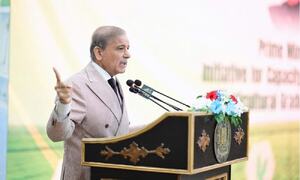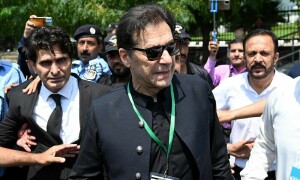The execution of a convict is irreversible. Nothing can bring the convict back to life if for some reason it is discovered later on that the order under which he was executed was invalid or new evidence has surfaced to the effect that he was wrongly implicated in the case which cost him his life. It is therefore natural with every judge, who is competent to award death sentence or the one who is petitioned to reverse that verdict, is duly circumspect about the validity of the law under which the sentence is awarded, and also seeks guidance from the case law. So it happened that as the appeal against the execution of six persons awarded by the military courts came up for hearing on Thursday the very legality of the 21st Constitutional Amendment and the Army Act 1952 under which their cases were heard and decided were already under adjudication by the 17-judge full court of the Supreme Court. What if by the time the full court invalidates the laws under which military courts delivered their verdicts the appeal against their executions stood dismissed and they had been executed. In the absence of the court's decision on the legality of these laws unfolding the military courts' verdicts was a huge risk. Through a short order issued after the hearing says the apex court has stayed "the death sentence to those who have been awarded by military courts and those who will be awarded death by military courts". The hearing will be resumed on April 22, in which the government is expected to file its reply in response to petitions filed by the Supreme Court Bar Association (SCBA), Pakistan Bar Council, Lahore High Court Bar Association and 11 other bar councils and associations against the 18th and 21st constitutional amendments. But the appeal against military courts' verdicts was filed by renowned lawyer and human rights activist Asma Jehangir.
It must be kept in mind the Supreme Court has not thrown out the military courts' verdicts, but only held them in abeyance. Nor is this suspension of the 21st Amendment under which the military courts were established. That amendment was passed by a unanimous parliamentary vote after the country's political leadership reached a decision to effectively counter the rising tide of terrorism. The hard fact is that those committing violent acts of terrorism were not being punished; one major reason being their threats delivered at homes of trial judges and unprotected witnesses. Their trial by the military courts was the only option. It was this national sentiment over the helplessness in bringing powerful criminals to justice that also forced the government to lift the moratorium on death penalties. And then these courts are no kangaroo courts as these have been set up under the authority of an elected parliament. Accepted in some respects their working appears to be in violation of the basic human rights. For instance, we learnt of its verdict of death against six and life imprisonment of seventh through media, instead of hearing it directly from their judges. There are also questions about the identity of convicts and the nature of their crimes, the place they were tried and who were the judges who delivered the verdicts. But these are essentially a matter of procedure and if it remains unexplained it is in the nature of the circumstances that mandated creation of military courts. Instead of jumping the gun it would be worthwhile to wait for the verdict of the Supreme Court on the constitutionality of the case.
BR100
15,115
Increased By
28.1 (0.19%)
BR30
43,048
Increased By
175.6 (0.41%)
KSE100
149,493
Increased By
257.8 (0.17%)
KSE30
45,518
Increased By
11.6 (0.03%)























Comments
Comments are closed.